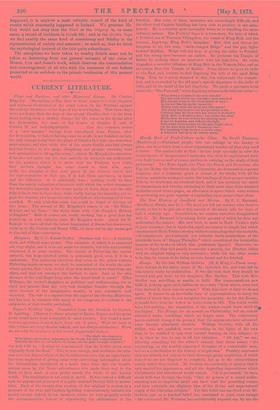Tegner's Frithjof Saga. Translated from the Swedish by Captain H.
Spalding. (Murray.)—Some account of Esaias Tegner and his great poem would have been acceptable to most readers. Nor would a more copious apparatus of notes have been out of place. What we have in this volume are very slender indeed, and not always satisfactory. When we are told, for instance, of the sword Angurvadel that.—
The blade was engraven With letters mysterious, unknown in the North, but well comprehended Towards the Sun, of our fathers the home, till the gods brought us hither,"
the note tells us, It must be remembered that the Gothic races came originally from the East." This is true enough, and doubtless the allu- sion is to the Aryan origin of the Scandinavian race, but an opportunity has been neglected of giving some very interesting information about the Orientalisms introduced at a much later time into the Scandi- navian races by the Norse adventurers who made their way to the East, as they made it over pretty nearly the whole of the known world. The translation is not even in merit. It was indeed a difficult task for anyone not possessed of a quite unusual literary skill to under- take. Each of the twenty-four sections of the original is written in a measure of its own, and Captain Spalding conscientiously imitates his model, except, indeed, in one instance, where he very properly avoids the unremunorative labour of reproducing the alliterations of the Swedish. But some of these measures are exceedingly difficult, and the effect that Captain Spalding has been able to produce is not satis- factory. He is certainly most successful when he is handling the more ordinary metres. The Frithjof Saga is a love-story, the hero of which is Frithjof, son of Thorsten Vikingston, the vassal of King Bold, and the heroine, Ingeborg, King Bold's daughter. Bold dies and leaves his kingdom to his two sons, "dark-visaged Helge " and the gay, light- hearted Halfdan. Flelge will not hear of giving his sister to Frithjof, and the young hero becomes an outlaw. He profanes the Temple of Balder by seeking there an interview with his lady-love. He visits Angantyr, a revolted tributary of King Bald in the Western Isles, and on his return fires the Temple of Balder. From thence he goes an exile to the East, and returns to find Ingeborg the wife of the aged King Ring. Ring he is sorely tempted to slay, but withstands the tempta- tion, and is rewarded by the old man's speedy departure to the halls of Odin, and by the hand of the fair Ingeborg. We quote a specimen fronx canto viii., "The Farewell," when Ingeborg refuses to fly with her lover
What were a woman if she rent asunder The ties with which the Almighty bath attached Her slender form to the stern breast of man?
Is she not like the pallid water-lily, Which rises with the wave and falls again?
The sharp keel passes o'er her prostrate form, Careless, may be, how sore her breast is wounded.
Such, then, is woman's fate; but whilst the plant Holds firm its root within the shifting sand, It has its beauties, and reflects the light Sent down from heaven by the pale bright stars, On the blue deep itself a beauteous star; But breaking from its root, it drifts away,
A withered leaf upon the watery waste."


































 Previous page
Previous page